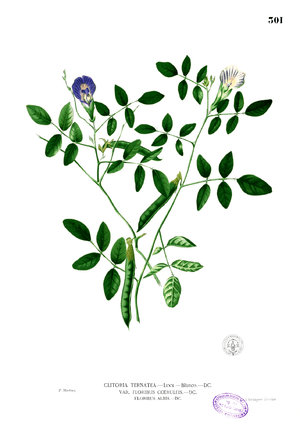Clitoria
| Clitoria | |
|---|---|
.jpg) | |
| Clitoria ternatea | |
| Scientific classification | |
| Kingdom: | Plantae |
| (unranked): | Angiosperms |
| (unranked): | Eudicots |
| (unranked): | Rosids |
| Order: | Fabales |
| Family: | Fabaceae |
| Subfamily: | Faboideae |
| Tribe: | Phaseoleae |
| Subtribe: | Clitoriinae |
| Genus: | Clitoria L. |
| Species | |
|
Many, see text. | |
| Synonyms | |
| |
Clitoria is a genus of Old World, insect-pollinated flowering pea vines.
Distribution and uses
These plants are native to tropical and temperate areas of the world, including Southeastern Asia (Indonesia & Malaysia) and Madagascar, where the flowers are often used as a food dye or dipped in batter and deep-fried.
The most widely known species of the genus is Clitoria ternatea, also known as butterfly pea. It has medicinal uses and it is used as food, as well. Its roots are used in ayurveda Indian medicine.[1]
Naming of the genus
This genus was named after the human clitoris, for the flowers bear a resemblance to the vulva. Originally the first described species of the genus was given the name Flos clitoridis ternatensibus in 1678 by Rumpf, a German-born botanist employed by the Dutch East India Company. It was regarded as appropriately named by Johann Philipp Breyne in 1747.[2] Many vernacular names of these flowers in different languages are similarly based on references to a woman's sexual organ.[3]
Controversies existed in the past among botanists regarding the good taste of the naming of the genus. The analogy drew sharp criticism from botanists such as James Edward Smith in 1807, Amos Eaton in 1817, Michel Étienne Descourtilz in 1826, and Eaton and Wright in 1840. Some less explicit alternatives, like Vexillaria (Eaton 1817) and Nauchea (Descourtilz 1826), were proposed, but they failed to prosper, and the name Clitoria has survived to this day.[4]
Species

- Clitoria albiflora Mattei
- Clitoria amazonum Benth.
- Clitoria andrei Fantz
- Clitoria angustifolia Kunth
- Clitoria annua J. Graham
- Clitoria arborea Benth.
- Clitoria arborescens R. Br.
- Clitoria australis Benth.
- Clitoria biflora Dalziel
- Clitoria brachystegia Benth.
- Clitoria bracteata Poir.
- Clitoria brasiliana L.
- Clitoria cajanifolia (C. Presl) Benth.
- Clitoria capitata Rich.
- Clitoria dendrina Pittier
- Clitoria fairchildiana R. A. Howard
- Clitoria falcata Lam.
- Clitoria fragrans Small
- Clitoria glycinoides DC.
- Clitoria guianensis (Aubl.) Benth.
- Clitoria heterophylla Lam.
- C. h. var. heterophylla
- C. h. var. pedunculata (Bojer ex Benth.) Fantz
- Clitoria javitensis subsp. javitensis
- Clitoria laurifolia Poir.
- Clitoria linearis Gagnep.
- Clitoria mariana L.
- Clitoria mearnsii De Wild.
- Clitoria mexicana Link
- Clitoria moyobambensis Fantz
- Clitoria nana Benth.
- Clitoria pedunculata Bojer ex Benth.
- Clitoria pinnata (Pers.) R. H. Sm. & G. P. Lewis
- Clitoria plumieri Turpin ex Pers.
- Clitoria polyphylla Poir.
- Clitoria racemosa G. Don
- Clitoria racemosa Benth.
- Clitoria rubiginosa Pers.
- Clitoria sagotii Fantz
- Clitoria schiedeana Schltdl.
- Clitoria stipularis Benth.
- Clitoria tanganicensis Micheli
- Clitoria ternatea L.
- C. t. var. albiflora Voigt
- Clitoria virginiana L.
- Clitoria woytkowskii Fantz
- Clitoria zanzibarensis Vatke
- Clitoria zanzibarensis Mengkoemieng
Gallery
- The shape of the Clitoria flowers has inspired the name of the genus
.jpg) Clitoria mariana flower
Clitoria mariana flower_in_Shantinagar%2C_Dhaka.jpg) Clitoria ternatea, known as Neel Aporajita in Bangladesh
Clitoria ternatea, known as Neel Aporajita in Bangladesh Clitoria tea
Clitoria tea
See also
References
- ↑ "APARËJITË (Root)". The Ayurvedic Pharmacopoeia of India (Part I Volume II) (PDF). Ministry of Health and Family Welfare. pp. 10–11.
- ↑ Paul R. Fantz, Nomenclatural notes on the genus Clitoria
- ↑ Clitoria ternatea
- ↑ Fantz, Paul R. (1991). "Ethnobotany of Clitoria (Leguminosae)". Economic Botany. New York Botanical Garden Press. 45 (4): 511–20. JSTOR 4255394. doi:10.1007/BF02930715.
Further reading
| Wikispecies has information related to: Clitoria |
- Rai KS, Murthy KD, Karanth KS, Rao MS (July 2001). "Clitoria ternatea (Linn) root extract treatment during growth spurt period enhances learning and memory in rats". Indian Journal of Physiology and Pharmacology. 45 (3): 305–13. PMID 11881569.
| Wikimedia Commons has media related to Clitoria. |